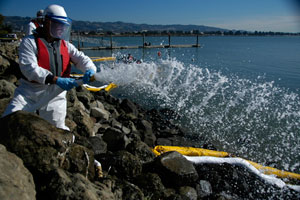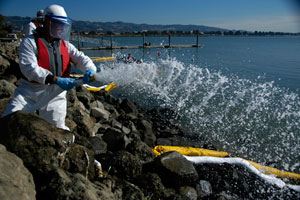
Photo courtesy of the Coast Guard.
The Gulf may “open for business” again now that the Obama administration dropped the moratorium on new deepwater drilling, but there’s little evidence that the federal government is any more prepared to deal with another disaster like the Deepwater Horizon. Case in point: The recent spill commission report made it clear that the lack of adequate government planning for the use of chemical dispersants “handicapped” the response effort. But regulators still don’t have much of a plan for how they’re going to use dispersants if there is another spill.
On Wednesday, a coalition of community groups, shrimpers, and environmental organizations filed a petition urging the Environmental Protection Agency to fix the dispersant planning problem. The groups want the EPA to establish rules about which chemicals can be used in future spills and at what point they can be dumped into the water.
The coalition, which filed its petition through the enviromental lawyers at Earthjustice, asked the EPA to require manufacturers to disclose the ingredients they use in dispersants. They also want more in-depth testing of the toxicity of the products. Both are issues highlighted in my magazine piece this month, which focuses on the lack of regulation of these chemicals. Nearly two million gallons of dispersant are already in the Gulf, so it’s a little late to second-guess these substances’ use in this disaster. But that doesn’t mean that dispersant manufacturers should continue to operate without any oversight.
The Earthjustice petition was filed on behalf of the Louisiana Shrimp Association, Florida Wildlife Federation, Gulf Restoration Network, the Alaska-based Cook Inletkeeper, Alaska Community Action on Toxics, Waterkeeper and the Sierra Club. The groups also filed a 60-day-notice of intent to sue for access to information about where dispersants can be used and how much is safe. (They say that disclosure is required under the Clean Water Act.)
“Unprecedented use of toxic dispersants during the BP Deepwater Horizon Disaster without prior scientific study and evaluation on the effect to Gulf of Mexico marine ecosystems and human health was a horrific mistake that should never have been allowed to happen,” said Clint Guidry of the Louisiana Shrimp Association.
“Because so little is currently known by EPA—or anyone else for that matter—about the long-term impact to fish and wildlife, the use of dispersants is a dangerous and potentially devastating experiment,” said Cynthia Sarthou, director of the Gulf Restoration Network.










